现代大学英语精读3unite3
Unit_03_A_Dill_Pickle_现代大学英语精读第三册第三单元
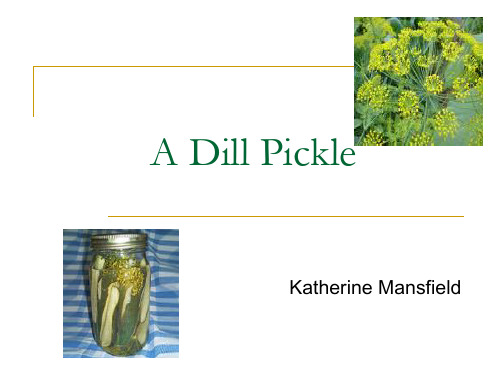
Critics praised her for
her capturing the essence of Chekhov's art for stories emphasizing atmosphere and actual life rather than exciting plot, and
man and the woman from their speech and behaviors?
Part 1 (1-12) – appreciation
decorated with sth peel an orange opposite
The bank is opposite the supermarket. (prep.) Answers are given on the opposite page. (adj.)
A Dill Pickle
Katherine Mansfield
I. Introduction to the author
Kaborn in Wellington, New Zealand, was an outstanding short story writer.
III. Structure of the text
Part 1 (1-12), coming across of the two people Part 2 (13-22), recalling of Kew Garden Part 3 (23-44), recalling of the trip to Russia Part 4 (45-52), recalling of the man’s childhood Part 5 (53-66), ending of the story
Unit 03 A Dill Pickle 现代大学英语精读第三册第三单元 ppt课件
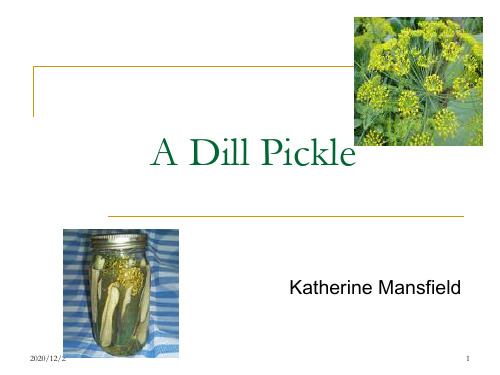
2020/12/2
5
Critics praised her for
her capturing the essence of Chekhov's art for stories emphasizing atmosphere and actual life rather than exciting plot, and
2020/12/2
2
精品资料
• 你怎么称呼老师?
• 如果老师最后没有总结一节课的重点的难点,你 是否会认为老师的教学方法需要改进?
• 你所经历的课堂,是讲座式还是讨论式? • 教师的教鞭
• “不怕太阳晒,也不怕那风雨狂,只怕先生骂我 笨,没有学问无颜见爹娘 ……”
• “太阳当空照,花儿对我笑,小鸟说早早早……”
for her “refreshing originality” and “sensitiveness to beauty”.
However, just as she won world fame, her health grew worse. She died of tuberculosis in 1923, when she was 35 years old.
raise the veil unbutton the collar loathe (infml. not used in progressive = detest)
现代大学英语精读3_unit_3课后答案
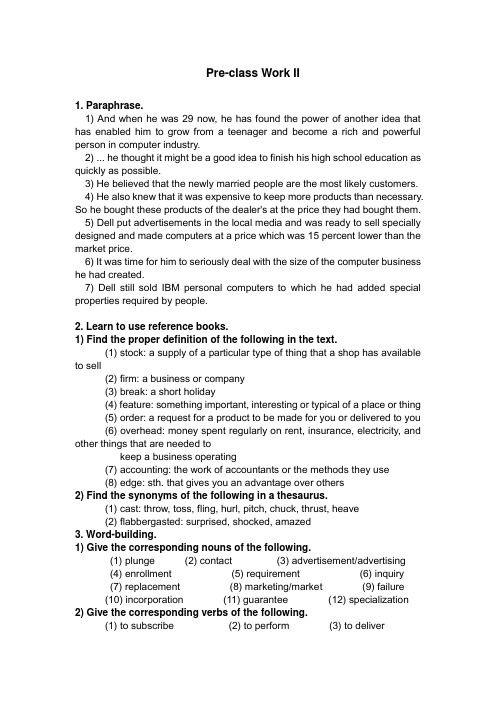
Pre-class Work II1. Paraphrase.1) And when he was 29 now, he has found the power of another idea that has enabled him to grow from a teenager and become a rich and powerful person in computer industry.2) ... he thought it might be a good idea to finish his high school education as quickly as possible.3) He believed that the newly married people are the most likely customers.4) He also knew that it was expensive to keep more products than necessary. So he bought these products of the dealer's at the price they had bought them.5) Dell put advertisements in the local media and was ready to sell specially designed and made computers at a price which was 15 percent lower than the market price.6) It was time for him to seriously deal with the size of the computer business he had created.7) Dell still sold IBM personal computers to which he had added special properties required by people.2. Learn to use reference books.1) Find the proper definition of the following in the text.(1) stock: a supply of a particular type of thing that a shop has available to sell(2) firm: a business or company(3) break: a short holiday(4) feature: something important, interesting or typical of a place or thing(5) order: a request for a product to be made for you or delivered to you(6) overhead: money spent regularly on rent, insurance, electricity, and other things that are needed tokeep a business operating(7) accounting: the work of accountants or the methods they use(8) edge: sth. that gives you an advantage over others2) Find the synonyms of the following in a thesaurus.(1) cast: throw, toss, fling, hurl, pitch, chuck, thrust, heave(2) flabbergasted: surprised, shocked, amazed3. Word-building.1) Give the corresponding nouns of the following.(1) plunge (2) contact (3) advertisement/advertising(4) enrollment (5) requirement (6) inquiry(7) replacement (8) marketing/market (9) failure(10) incorporation (11) guarantee (12) specialization 2) Give the corresponding verbs of the following.(1) to subscribe (2) to perform (3) to deliver(4) to donate (5) to consume (6) to entitle(7) to manufacture (8) to equip (9)to compute3) Translate the following based on what you know about rules of word-building.(1)现在的问题不是生产过剩,而是消费不足。
大学英语精读第三册课后答案unit3
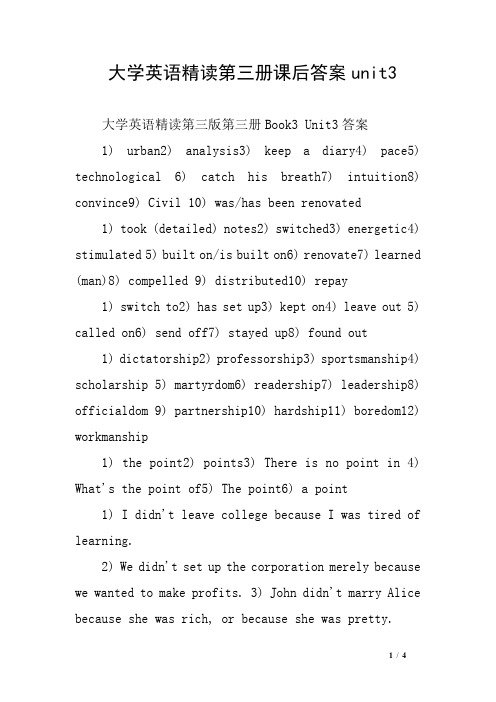
大学英语精读第三册课后答案unit3大学英语精读第三版第三册Book3 Unit3答案1) urban2) analysis3) keep a diary4) pace5) technological 6) catch his breath7) intuition8) convince9) Civil 10) was/has been renovated1) took (detailed) notes2) switched3) energetic4) stimulated 5) built on/is built on6) renovate7) learned (man)8) compelled 9) distributed10) repay1) switch to2) has set up3) kept on4) leave out 5) called on6) send off7) stayed up8) found out1) dictatorship2) professorship3) sportsmanship4) scholarship 5) martyrdom6) readership7) leadership8) officialdom 9) partnership10) hardship11) boredom12) workmanship1) the point2) points3) There is no point in 4) What's the point of5) The point6) a point1) I didn't leave college because I was tired of learning.2) We didn't set up the corporation merely because we wanted to make profits. 3) John didn't marry Alice because she was rich, or because she was pretty.4) He didn't join the Confederate army because he stood for slavery.5) The police didn't arrest him because he had really committed any crime, or because he was an escaped prisoner.1) We all left the meeting convinced that the project was feasible.2) Peter got home tired out from the three-month-long journey to the Antarctic. 3) They went hunting for hours, but they returned empty-handed.4) He entered the office still annoyed by the way she had spoken to him.1) himself in the ward of a hospital 2) themselves surrounded by enemy forces 3) themselves reading it with fresh eyes 4) himself tailed by a man in black 5) myself doubting my own judgment 6) ourselves in a large valley1) analysis2) professions3) energetic4) catch his breath 5) staying up6) convinced7) stimulating8) administrative 9) switch10) pace11) reflection12) spark13) repaying1)you2)or3)wonder4)parent5)of6)help7)on8)how9)telling10)treat11)when12)and13)criticize14)with 15)response16)you17)class18)not19)realize/understan d20)Because21)specialized22)about23)know24)well25)to o26)what27)different28)from29)behavior 翻译1) 许多美国大学生申请政府贷款交付学费。
大学英语精读第三册教案三单元Unit-3-Why-I-Teach

Chinese stimulate: vt. 刺激; 激励; 鼓励
TImheatekgaeocmhveybrnoewmcaneunsmetipsItlaaklnieksse,tottohcelueatfrrtanexemdeosymionwtno orldesesrotnos,stitmo ulsatitme uthlaeteecmonyosemlfy. and my
need? 5) Which teacher do you like best, why?
Words and expressions
ቤተ መጻሕፍቲ ባይዱ
palm tree 棕榈树
Do the rewards of teaching outweigh the trying moments?
outweigh: v.
be more important or valuable than sth. else • 比…重(在重量上);比…重要;比…有价值
InaGcaredeemk imc cyathleonldoagry.,JNuanrec, iJsusluys, afnedll in lovAeuwguitsht ohfifseroawnnorpepfolerctutinointyinfoar pool of wTharbeteuefIiflrlae.ttcecotatincothhncha,barteencssagoeueal.dsreWicehtrhesaaencnahdrtiehnwegorminitsiantahtgepe.rrisoatflreiesssetithosne is saamreef,leIccthioanngoef —ho—w atenrdr,ifmieodrethime portant, gomveyrsntmudeennttsisc.hange. On reflection, I decided I had been wrong.
现代大学英语精读三 Unit 3 A Dill Pickle
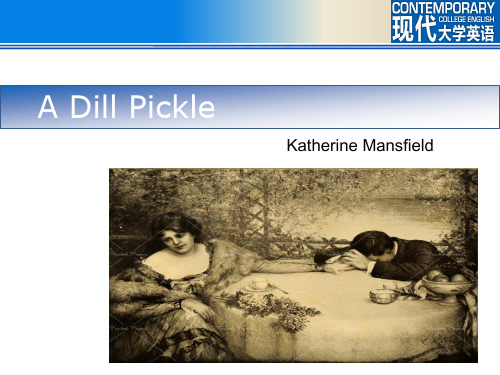
Character Analysis
Vera
Questions for thinking: 1. How did Vera feel when she saw her former lover? Was she still attached to him?
2.
3.
Why did Vera break up with the man six years earlier?
c) discuss the major themes of the story.
2. Difficulty: Appreciate literature a) read the story from a particular perspective: feminism;
b) interpret the symbols.
Character Analysis
Examples for the woman’s character:
1.I don’t feel very well. I can’t bear this weather. Loathe it(cold). 2. …and of how it(the trick of interrupting her) used to exasperate her six years ago. 3. But now, as he spoke, the memory faded. His was the truer. (Her memory became weaker and weaker, while his memory , the memory of the wonderful time they had at Kew Gardens, was the truer.) 4. No, I’ve no piano. Sold. Ages ago. 5. “ The dog was called Bosun,” “What dog? Had you a dog?” 6. But as she watched him draw her glove through his fingers, gentle, gently, her anger really did die down./she lifted her head as though she drank something. 7. “ Just the same. I am as alone as ever.”
现代大学英语精读第二版book3unit3资料

Unit 3
Warming up
Warming up Questions/Activities
1. Retelling Reconstruct the story by chronological order—how they fell in love and then broke up, what might have happened to each of them during the time before they met again.
Warming up Check-on Preview
Fill in the blanks. 1. He closed his eyes an instant, but opening them his face _l_it_
up as though he had _s_tr_u_c_k_ a match in a dark room. 2. He __l_a_y__down the orange and _ta_p_p_e_d_ on the table for the
Objectives
1. Understand the story: theme & character.
2. Appreciate literature:
• read between the lines; • read the story from a particular perspective: feminism; • interpret the symbols.
• Bliss: and Other Stories (1923) ➢ Stream of consciousness ➢ Characters’ psychological activities with detailed
现代大学英语精度3第二版unit3 预习

Unit 3 The Dill Pickle1. GlossaryWord list:1.astound2. bound3. decorate4.exsaperate5.haunt6. indecision7.luxury8.mockery9.sufficient 10.unfold2. Key words: snap/fix/stretch/beyond/apart3. Phrases, idioms and expressionsapart from sb. as everas it werebe a habit with sb.be amazed atbe decorated withbe out of all proportion to the occasionbound to one’s feetbreak inbreak out loud and tragic clutch atdie downdrum on the tablefix one’s stare upon flap atfor all your telling mego for a picnichaven’t a corner in one’sheart forhold the hand to one’s checkhover over sb.lay down sth.lean back in one’s chairlean overlet it go at thatprick up one’s earsput one’s head in sb.’s lapput one’s arms round sb.ripple against the banks insilent, velvet wavesroll overshare sth. With sb.slumber so long within one’sbosomsnap the cigarette case totake such a leap back to thattimetap the end of one’s cigaretteagainst the ashtraywave sb./sth.away4. Synonymsparticular; specialshiver; shudderangry; exasperated; infuriated wonderful; admirable; marvelous; splendid shock; astoundsad; tragic; mournful; melancholy dislike; hate; loathe5. Grammar1) exclamatory sentence2) for structures: as though; what it is……that; what had remained of……; wrote to me as you did6. Back ground information1) author2) Corsica3) the Volga River4) Kew Gardens5) The Black Sea6) Siberia7. Preview questions about the text.1) How do you like this story? Do you think it a good example of the kind of short stories Mansfield is famous for?2) What is the story about? Is there any particularly interesting plot in the story? What is the power of the story mainly based on?3) What do you know about these two characters? Can you give a character sketch for each of them based on the bits of information scattered in the text and the clues provided by the author? 4) Do you find any lines particularly beautiful?8. Writing Devices1) the use of rhetorical questions2) the use of wh-questions9. Sentence Paraphrase1) I’m still just as ignorant for all your telling me. (13)2) But now, as he spoke, that memory faded. His was truer. (15)3) He had lost all that dreamy vagueness and indecision. (22)4) Now he had the air of a man who has found his place in life. (22)5) As he spoke……she felt the strange beast that had slumbered so long within her bosom stir, stretch itself, yawn, prick up its ears, and suddenly bound to its feet, and fix its longing, hungry stare upon those far away places. (31)Quiz1. Put in the right form or derivative of the word1) The interior ______ (decorate) of this hotel will be in traditional Chinese style.2) We need someone with ______ (manage) skills.3) Those gentle ______ (roll) hills are a delightful sight.4) this left her with a ______ (linger) pain.5) It is not a serious problem. But it is quite ______(trouble).6) Never act on ______ (impulse). ______ (impulse) people always do things they will regret later.2. Translation1) 他用手不耐烦地在桌子上敲击着。
大学英语精读:第三册UNIT3

Every teacher probably asks himself time and again: What are the reasons for choosing teaching as a career? Do the rewards teaching outweigh the trying comments? Answering these questions is not a simple task. Let's see what the author says.Why I TeachPeter G. Beidler Why do you teach? My friend asked the question when I told him that I didn't want to be considered for an administrative position. He was puzzled that I did not want what was obviously a "step up" toward what all Americans are taught to want when they grow up: money and power. Certainly I don't teach because teaching is easy for me. Teaching is the most difficult of the various ways I have attempted to earn my living: mechanic, carpenter, writer. For me, teaching is a red-eye, sweaty-palm, sinking-stomach profession. Red-eye, because I never feel ready to teach no matter how late I stay up preparing. Sweaty-palm, because I'm always nervous before I enter the classroom, sure that I will be found out for the fool that I am. Sinking-stomach, because I leave the classroom an hour later convinced that I was even more boring than usual. Nor do I teach because I think I know answers, or because I have knowledge I feel compelled to share. Sometimes I am amazed that my students actually take notes on what I say in class! Why, then, do I teach? I teach because I like the pace of the academic calendar. June, July, and August offer an opportunity for reflection, research and writing. I teach because teaching is a profession built on change. When the material is the same, I change —— and, more important, my students change. I teach because I like the freedom to make my own mistakes, to learn my own lessons, to stimulate myself and my students. As a teacher, I'm my own boss. If I want my freshmen to learn to write by creating their own textbook, who is to say I can't? Such courses may be huge failures, but we can all learn from failures. I teach because I like to ask questions that students must struggle to answer. The world is full of right answers to bad questions. While teaching, I sometimes find good questions. I teach because I enjoy finding ways of getting myself and my students out of the ivory tower and into the real world. I once taught a course called "Self-Reliance in a Technological Society." My 15 students read Emerson, Thoreau, and Huxley. They kept diaries. They wrote term papers. But we also set up a corporation, borrowed money, purchased a run-down house and practiced self-reliance by renovating it. At the end of the semester, we would the house, repaid our loan, paid or taxes, and distributed the profits among the group. So teaching gives me pace, and variety, and challenge, and the opportunity to keep on learning. I have left out, however, the most important reasons why I teach. One is Vicky. My first doctoral student, Vicky was an energetic student who labored at her dissertation on a little-known 14th century poet. She wrote articles and sent them off to learned journals. She did it all herself, with an occasional nudge from me. But I was there when she finished her dissertation, learned that her articles were accepted, got a job and won a fellowship to Harvard working on a book developing ideas she'd first had as my student. Another reason is George, who started as an engineering student, then switched to English because he decided he liked people better than things. There is Jeanne, who left college, but was brought back by her classmates because they wanted her to see the end of the self-reliance house project. I was here when she came back. I was there when she told me that she later became interested in the urban poor and went on to become a civil rights lawyer. There is Jacqui, a cleaning woman who knows more by intuition than most of us learn by analysis. Jacqui has decided to finish high school and go to college. These are the real reasons I teach, these people who grow and change in front of me. Being a teacher is being present at the creation, when the clay begins to breathe. A "promotion" out of teaching would give me money and power. But I have money. I get paid to do what I enjoy: reading, talking with people, and asking question like, "What is the point of being rich?" And I have power. I have the power to nudge, to fan sparks, to suggest books, to point out a pathway. What other power matters? But teaching offers something besides money and power: it offers love. Not only the love of learning and of books and ideas, but also the love that a teacher feels for that rare student who walks into a teacher's life and begins to breathe. Perhaps love is the wrong word: magic might be better. I teach because, being around people who are beginning to breathe, I occasionally find myself catching my breath with them. NEW WORDS administrative a. of the management of affairs ⾏政的,管理的 administration n. 管理(部门),⾏政(机关) puzzle vt. fill with doubt and confusion 使迷惑 step (-) up n. promotion; increase in size, speed, etc. mechanic n. skilled workman, esp. one who uses or repairs machines and tools 机械⼯;机修⼯ sweaty a. covered with sweat, sweating palm a. ⼿掌 profession n. occupation, esp. one requiring special training, such as law, medicine, or teaching convince vt. make (sb.) feel certain; cause (sb.) to realize compel vt. force (sb. or sth. to do sth.) pace n. rate or speed of development, or in walking, etc. 速度;步速 calendar n. ⽇程表,⽇历 opportunity n. favourable occasion or chance reflection n. careful thinking; consideration 深思;考虑 reflect vi. stimulate vt. encourage; excite 刺激;激励 freshman n. student in his first year at a college or university failure n. a person, attempt, or thing that fails; lack of success ivory n. 象⽛ ivory tower n. place or condition of retreat from the world of action into a world of ideas and dreams 象⽛塔 self-reliance n. ability to do things and make decisions by oneself 依靠⾃⼰;⾃⼒更⽣ reliance n. trust, confidence; dependence 信赖;信⼼;依靠 technological a. of or related to technology 技术的 corporation n. (AmE)有限公司 run-down a. old and broken or in bad condition renovate vt. restore (old buildings, oil paintings, etc.) to a former, better state 修复,修整 semester n. (AmE) either of the two periods into which a school year is divided; term 学期 repay。
现代大学英语精读3第3课翻译

第三课迈克尔·戴尔20亿美元梦想1.1977年的一天下午,当迈克·戴尔的父母和两个兄弟在墨西哥湾垂钓时,12岁的他坐在沙滩上,费尽心思地整理一根鱼线,这可以系好几个鱼钩一团乱绳。
“你是在浪费时间,”当家人收竿时,向迈克尔喊道。
“拿起鱼竿,享受乐趣吧!”2.迈克尔继续干着。
当他整理完的时候已经是晚饭时间了,其他人都准备休息了。
但是,这个年轻人却将鱼线远远的抛入水中,并将它固定在了一个深深插入土里的木棍上。
3.整个晚餐期间,家人都在拿小迈克尔开心,说他只能两手空空。
可是后来,当迈克尔收起鱼线时,鱼钩上却挂满了比其他所有人钓的加起来还要多的鱼!4.迈克尔·戴尔总是喜欢说,“如果你有好的想法,就去试试吧!”今天,在他29岁的时候,他已经发现了另一个好点子的巨大力量,这使得他在短短的几年间由一个十几岁的少年一跃成为了超级大亨。
他已成为美国个人电脑第四大生产商,而且是迄今为止世界五百强企业里最年轻的领军人物。
5.迈克尔和他的两个兄弟是在休斯敦长大的,他们深受父母的熏陶,具有强烈的求知欲和努力工作的动力。
即便如此,关于这个小男孩的故事还是早早传开了。
6.就象那次,当一位女推销员前来,要求和“迈克尔·戴尔先生”谈论关于他购买高中同等学历证书的事情。
片刻之后,8岁大的迈克尔解释说,也许这是一个非同一般的获得高中学历的好办法。
7.几年后,他又有了一个好主意,在邮票杂志上刊登广告来经销邮票。
他因此赚了2000美元,并用这笔钱买了自己的第一台个人电脑。
然后,他把电脑拆开以研究它的工作原理。
8.高中时,迈克尔曾为《休斯敦邮报》做过推销订阅的工作。
他认为,新婚夫妇是最佳的销售对象,所以他雇佣了一些朋友去抄写那些新近领取结婚证书的人的姓名和地址。
把这些资料都输入电脑,然后再发出私人信件(印有自己姓名和地址的信件),为每一对夫妇免费订阅两个星期的报纸。
9.这一次,戴尔赚取了18,000美元,然后买了一部宝马车。
大学英语精读第3册 第3课 课文翻译及课后答案
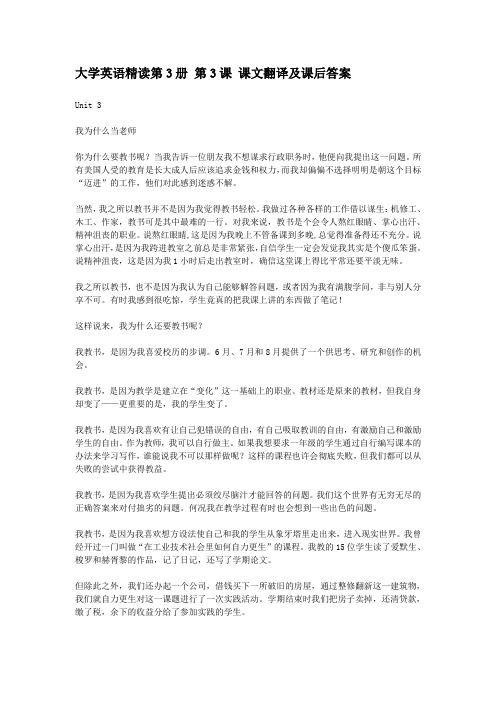
大学英语精读第3册第3课课文翻译及课后答案Unit 3我为什么当老师你为什么要教书呢?当我告诉一位朋友我不想谋求行政职务时,他便向我提出这一问题。
所有美国人受的教育是长大成人后应该追求金钱和权力,而我却偏偏不选择明明是朝这个目标“迈进”的工作,他们对此感到迷惑不解。
当然,我之所以教书并不是因为我觉得教书轻松。
我做过各种各样的工作借以谋生:机修工、木工、作家,教书可是其中最难的一行。
对我来说,教书是个会令人熬红眼睛、掌心出汗、精神沮丧的职业。
说熬红眼睛,这是因为我晚上不管备课到多晚,总觉得准备得还不充分。
说掌心出汗,是因为我跨进教室之前总是非常紧张,自信学生一定会发觉我其实是个傻瓜笨蛋。
说精神沮丧,这是因为我1小时后走出教室时,确信这堂课上得比平常还要平淡无味。
我之所以教书,也不是因为我认为自己能够解答问题,或者因为我有满腹学问,非与别人分享不可。
有时我感到很吃惊,学生竟真的把我课上讲的东西做了笔记!这样说来,我为什么还要教书呢?我教书,是因为我喜爱校历的步调。
6月、7月和8月提供了一个供思考、研究和创作的机会。
我教书,是因为教学是建立在“变化”这一基础上的职业。
教材还是原来的教材,但我自身却变了——更重要的是,我的学生变了。
我教书,是因为我喜欢有让自己犯错误的自由,有自己吸取教训的自由,有激励自己和激励学生的自由。
作为教师,我可以自行做主。
如果我想要求一年级的学生通过自行编写课本的办法来学习写作,谁能说我不可以那样做呢?这样的课程也许会彻底失败,但我们都可以从失败的尝试中获得教益。
我教书,是因为我喜欢学生提出必须绞尽脑汁才能回答的问题。
我们这个世界有无穷无尽的正确答案来对付拙劣的问题。
何况我在教学过程有时也会想到一些出色的问题。
我教书,是因为我喜欢想方设法使自己和我的学生从象牙塔里走出来,进入现实世界。
我曾经开过一门叫做“在工业技术社会里如何自力更生”的课程。
我教的15位学生读了爱默生、梭罗和赫胥黎的作品,记了日记,还写了学期论文。
现代大学英语精读3课后翻译吐血整理分析解析

Unit1 He is so devoted to 他对他的研究如此专心致志,从来没有过很快就要退休的念头。
1. his research that it never occurs to him that he will soon have to retire. Many people have 我们都有滥用权力的倾向。
如果没有有效的制约,很多人都曾说过,2. observed that, without effective checks, we all have a tendency to abuse our power. Some countries refuse 而且他们对外国的干涉非常反感。
有些国家拒绝卷入这一争端,3. to get involved in this dispute and they resent any foreign interference. of lot a involve will sandstorm of control The 控制沙城暴需要大量的工作和资金。
4. work and money. You must take the local conditions 你们用这些技术的时候,必须考虑到当地的条件。
5. into consideration when you apply these technologies. All applicants will 美元的报名费。
50所有的申请者都必须填好这些表格,然后邮寄6. have to fill out these forms and mail in an application fee of 50 dollars Based on his (careful) 学习是一种自然的乐趣。
他根据对孩子们行为的观察得出结论:7. he behavior, s ’childrenof observation natural a is learning that conclusion the to came pleasure. many of country a In 在一个多民族的国家里,各民族之间的和谐需要小心处理。
精读3unit3-the-dill-picklePPT课件
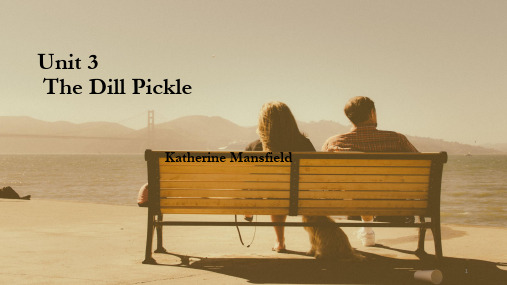
(behaving with an air of man)
Career
vague about future and life, dreamy, indecisive.
He had not then found his career.
successful, having established his reputation
6
Implication of the Title
When do people eat dill pickles? What's the main function of dill pickles?
Normally, people usually eat them during the meals in order to stir up their appetite.
➢ Stream of consciousness ➢ Characters’ psychological activities with detailed
descriptions and symbolism
3
Her Writing Feature
Author
Her emphasis on atmosphere and actual life rather than exciting plot Her refreshing originality and sensitiveness to beauty.
2. Feminist concern: What does a woman want? It was her “born duty to reckon everything subordinate to his comfort and pleasure, and to let him neither see nor feel anything coming from her, except what is agreeable to him.” —J. S. Mill, The Subjection of Women
Unit03ADillPickle现代大学英语精读第三册第三单元

Part 2 (13-22) – appreciation
haunt (vt. / n.)
a haunting memory 让人魂牵梦绕的回忆
maniac (n.) [(informal) a person who has a very strong interest in a particular activity] = fanatic (n.)
He is a football maniac.(狂热追随者;球迷)
maniac (n.) [(psychology) a person suffering from mania]
maniac (n.) [a person who behaves in a uncontrolled way, not worrying about risks or danger]
Some maniac was running down the street waving a massive metal bar. (疯子;不知深浅的家伙)
to the ridiculous. (从天堂掉进地狱;从极好变为极差) Her plans were held up to ridicule.(受到公众嘲讽) You lay yourself open to ridicule wearing clothes like
that.(容易招致嘲讽)
stupid or unreasonable] (荒唐的事情) It was only later that she could see the absurdity (n.) of
现代大学英语精读3-Unit3-A-Dill-Pickle教程文件
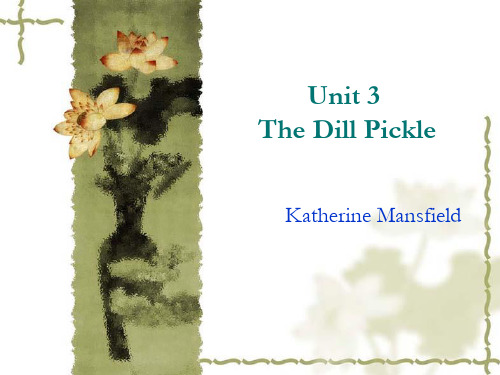
II. About Katherine Mansfield
1. her family background
2. her short story collections
Bliss and Other Stories (1920) The Garden Party and Other Stories(1922)
Unit 3 The Dill Pickle
Katherine Mansfield
review
discussion
analysis
review
to go over what we’ve learned
analysis
to analyze the text
discussion to discuss the implication of “A Dill Pickle”
From the woman's perspective
From the man's point of view
V.Homework
Please write a composition about the topic—"How to be a good lover?"
Thank you!
3. her writing features
--- her emphasis on atmosphere and actual life rather than exciting plot
her refreshing originality and sensitiveness to beauty.
How do people make a pickle?Байду номын сангаас
现代大学英语精读3第二版Unit3_Book3
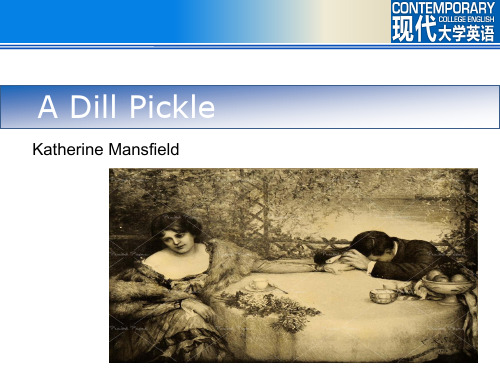
lay tapped He ______down the orange and ______ on the table for the waitress.
lingered His thoughts ________over the last meeting between them. unfolded And his memory ________ as he listened to the familiar song.
Warming up
Check-on Preview
Fill in the blanks.
1. 2. 3.
lit He closed his eyes an instant, but opening them his face ___ up as though he had ______ a match in a dark room. struck
Warming up
Warming up
1. Retelling
Questions/Activities
Reconstruct the story by chronological order—how they fell in love and then broke up, what might have happened to each of them during the time before they met again. 2. Role play Dramatize the scene of their reencounter—pay attention to the subtlety of tone, look, and action.
It was her “born duty to reckon everything subordinate to his comfort and pleasure, and to let him neither see nor feel anything coming from her, except what is agreeable to him.” —J. S. Mill, The Subjection of Women
现代大学英语精读3 Unit3 A Dill Pickle
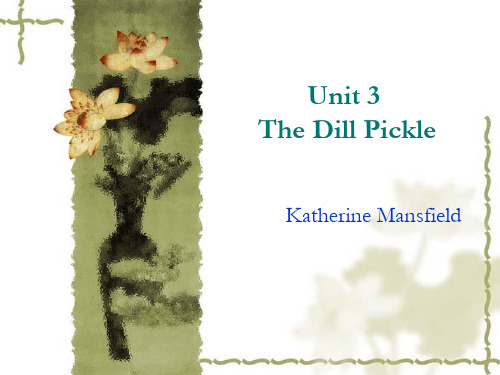
I. The plot summary
II. About Katherine Mansfield
1. her family background
2. her short story collections
Bliss and Other Stories (1920)
The Garden Party and Other Stories(1922)
How do people make a picபைடு நூலகம்le?
pill
garlic vinegar
When and why do people eat dill pickles? How does a dill pickle taste?
Look at the implication of the title from various perspectives.
Thank you!
Implication of the Title
From the woman's perspective
From the man's point of view
V.Homework
Please write a composition about the topic—"How to be a good lover?"
Unit 3 The Dill Pickle
Katherine Mansfield
review
discussion
analysis
review analysis discussion
to go over what we’ve learned to analyze the text to discuss the implication of “A Dill Pickle”
现代大学英语精读三 Unit 3 A Dill Pickle精编版

3. Why did he “let it go at that” when Vera told him she had sold her piano?
A Dill Pickle
Katherine Mansfield
Objectives
1. Understand the story: theme & character. a) learn to piece together the plot of a fragmentary story. b) give character sketches of the 2 people in the story and find out evidence from
Plot
Who: Vera and her ex-lover (his name was never told) When: 6 years after their separation Where: in a restaurant What: They recalled their previous days Why:
Detailed Analysis
1.Para 1: “And then, after six years, she saw him again.” Question: What can you infer from this sentence? 1) They must have known each other before. 2) For some unknown reason, they had not seen each for 6 years. 2. Para 2: “ He didn’t know her. She smiled, he frowned…in a
- 1、下载文档前请自行甄别文档内容的完整性,平台不提供额外的编辑、内容补充、找答案等附加服务。
- 2、"仅部分预览"的文档,不可在线预览部分如存在完整性等问题,可反馈申请退款(可完整预览的文档不适用该条件!)。
- 3、如文档侵犯您的权益,请联系客服反馈,我们会尽快为您处理(人工客服工作时间:9:00-18:30)。
5
decorate
v. 1. make more attractive by adding ornament, colour, etc 2. be beautiful to look at synonym: vt. 装饰;布置;授勋给 paint , hang , make , post vi. 装饰;布置 set sth out , trick out root: decor adj. decorative decorated adv. decoratively n. decoration decor decorator
8
drum 英 [drʌm] 美 [drʌm]
n. the sound of a drum v. make a rhythmic sound phrase: 1. drum sb out of sth eg. The minister was drummed out of office when it was discovered that he had been taking bribes. 2. drum sth into sb eg. The importance of good manners was drummed into us at an early age. 3.drum up竭力争取 4.drum tower 鼓楼 5.drum for v. 招徕;鼓吹 6.brake drum 刹车鼓 7.boiler drum 锅炉汽包
11
flap 英[flæp] 美 [flæp]
v. ① to wave something, especially wings when or as if flying eg. 1.A small bird flapped its wings furiously and flew upwards. 2.Flags flapped in the breeze above their tents. ② to behave in a nervous and excited way eg. Don't flap, there's plenty of time to cook before they arrive. n. a state of nervous excitement eg. She's in a flap because her parents are coming to visit.
4
champagne
英 [ʃæm'peɪn] 美 [ʃæm'pen]
n. a white sparkling wine either produced in Champagne or resembling that produced there
Phrase: pink champagne champagne bottle eg. 1. The champagne cork popped when he pulled it out. 2. We took supper and champagne and ate and drank on the grass. 3. No need to serve costly champagne.
Phrase: skin flap 皮瓣 flap gate 铰链式闸门;翻转板 flap valve 瓣阀;片状阀
12
geranium英 [dʒɪ'reɪnɪəm] 美 [dʒə'renɪəm]
n. any of numerous plants of the family Geraniaceae Phrase: rose geranium 香叶天竺葵 eg. 1. Yes, it had been a wonderful afternoon, full of geranium andmarigold and verbena, and–warm sunshine. 2. Relaxants: ylang ylang, geranium and rose.
3
n.
bosom
英 ['bʊz(ə)m] 美 ['bʊzəm]
1. the chest considered as the place where secret thoughts are kept. 2. a person's breast or chest. v. 1. hide in one's bosom 2. squeeze (someone) tightly in your arms, usually with fondness Phrase: bosom friend in the bosom of eg. 1. The child buried its face in its mother's bosom. 2. His bosom is clear. 3. The threat of death makes bosom buddies of us all.
9
egoist 英 ['iːɡəʊɪst] 美 ['iɡoɪst]
n. a conceited and self-centered person
conjugate: root: ego adj. egoistic 自我中心的 egoistical 自我中心的 n. ego 自我,自负 egoism 利己主义,自我主义 eg. 1. John is such an egoist that he only cares about himself. 2. It is better to be temporarily an egoist than never to be just.
◆root: barbaric
adj. barbarous barbaric adv. barbarously
n. barbarism barbarization
2
beak
英 [biːk] 美 [bik]
n. beaklike mouth of animals other than birds root: beak adj. beaked ,beakless eg. 1. Ever since then, Raveቤተ መጻሕፍቲ ባይዱ has had a curved beak. 2.This is an actual monster, some sort of rodent-like creature with a dinosaur beak.
10
exasperate 英 [ɪg'zæsp(ə)reɪt; eg-] 美 [ɪɡ'zæspəret]
v. 1. to make someone very annoyed, usually when they can do nothing to solve a problem 2. make furious eg. The sheer futility of it all exasperates her. root: exasperate adj. exasperated 激怒的;恼火的 exasperating 激怒人的;气死人的 n. exasperation 恼怒;恶化; v. exasperated 使恼怒;激怒;恶化 eg. The important thing is that you do not panic, as this will only exasperate the negative experience.
barbarian 英 [bɑː'beərɪən] 美 [bɑr'bɛrɪən]
n. 1. a member of an uncivilized people 2. a crude uncouth ill-bred person lacking culture or refinement synonym: goth , hun adj. without civilizing influences synonym: brutal, wild eg. Consequently, education and religion working side by side can transform a barbarian into a civilized person.
13
haunting
英 ['hɔːntɪŋ] 美 ['hɔntɪŋ]
adj. beautiful, but in a sad way and often in a way which cannot be forgotten Phrase: 1.a haunting melody 2.the haunting beauty of Africa eg. 1. It seemed like they were haunting me. 2. I know from personal experience that this can be a haunting thing.
7
dreamy
英 ['dri:mɪ] 美 ['drimi]
adj. dreamy in mood or nature conjugate: root: dream adj: dreaming dreamless dreamlike adv: dreamily n: dreamer dreaminess eg. 1. Man, therefore, is a curious, dreamy, humorous and wayward creature. 2. His face assumed a sort of dreamy expression.
ashtray
英 ['æ ʃtreɪ] 美 ['æ ʃtre]
n. a receptacle for the ash from smokers' cigars or cigarettes
